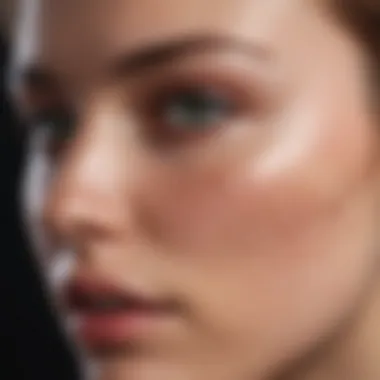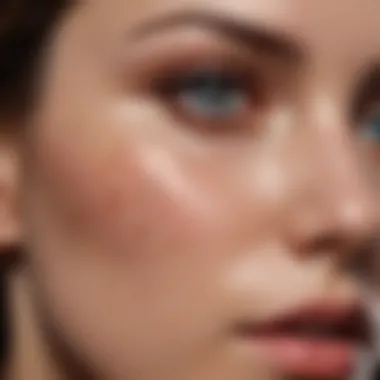Unveiling the Science Behind Medical Creams for Acne Scars: A Comprehensive Guide


Trend Report
As we venture into the realm of medical creams for acne scars, a noteworthy trend emerges in the skincare industry. Recent advancements have paved the way for innovative formulations that target not just the symptoms but the root causes of acne scarring. Manufacturers are now focusing on potent ingredients and cutting-edge technologies to deliver visible results in skin rejuvenation. This evolution signifies a shift towards efficacious solutions tailored to meet the specific needs of individuals combating acne scars, reflecting a consumer-driven demand for science-backed skincare products.
Style Guides
In the pursuit of an effective skincare regimen for acne scars, understanding the role of medical creams as wardrobe essentials for the skin becomes imperative. These specialized formulations, much like staple pieces in a wardrobe, work harmoniously to nourish, repair, and revitalize damaged skin. Just as wardrobe essentials form the foundation of a chic outfit, these medical creams form the cornerstone of an advanced skincare routine designed to diminish acne scars and promote overall skin health. By incorporating them into daily skincare rituals, individuals can elevate their skincare game and unveil a smoother, more radiant complexion.
Beauty Tips & Hacks
Delving into the intricacies of clinical dermatology and skincare, one cannot overlook the significance of proper makeup removal techniques prior to applying medical creams for acne scars. Ensuring a clean canvas free from makeup residues and impurities is crucial for enhancing the absorption and efficacy of these targeted treatments. By integrating a meticulous skincare routine that includes gentle cleansing, exfoliation, and toning, individuals can optimize the benefits of medical creams and accelerate the skin's healing process. This holistic approach to skincare represents a fusion of science and self-care, empowering individuals to take charge of their skin's well-being with informed decisions and transformative results.
Product Reviews
When exploring the landscape of skincare products tailored for acne scars, in-depth reviews of medical creams play a pivotal role in guiding consumers towards informed choices. Transparent assessments of efficacy, ingredients, and user experiences shed light on the performance and value of these specialized formulations. By delving into comprehensive product reviews, individuals can gain valuable insights into the strengths, limitations, and comparative advantages of different medical creams available in the market. Armed with this knowledge, they can make confident decisions in selecting the most suitable treatment for their unique skin concerns, thereby embarking on a transformative skincare journey with clarity and assurance.
Introduction
In the intricate realm of skincare, the quest for flawless skin often intersects with the lingering aftermath of acne - scars. Acne scars, insidious souvenirs of erstwhile breakouts, can mar one's complexion and self-assurance. As individuals journey through the maze of skincare offerings, the significance of medical creams tailored to combat acne scars becomes profound. This segment of the article will peel away the layers of ambiguity surrounding acne scars, paving the way for a deeper comprehension of how targeted treatments can alleviate this persistent skin concern.
Understanding Acne Scars
Acne scars serve as poignant reminders of past acne eruptions, perpetuating emotional and aesthetic distress for many individuals. Understanding the nature of acne scars is pivotal in devising effective treatment strategies. These scars manifest as textural variances on the skin's surface post-inflammatory acne episodes. They can appear as depressions (atrophic) or raised areas (hypertrophic), shaping the skin's topography in distinct ways. Comprehensive knowledge of the diverse types of acne scars is imperative for tailoring appropriate interventions.
Types of Acne Scars
Diving deeper into the intricacies of acne scars reveals a spectrum of classifications based on their appearance and pathophysiology. Atrophic scars, characterized by indentations in the skin, include icepick, rolling, and boxcar varieties. Conversely, hypertrophic scars result from excess collagen production during the wound-healing process, leading to raised scar formations. Acknowledging the nuances of each acne scar type empowers individuals to navigate the sea of treatment options with informed discernment.
Challenges in Treating Acne Scars
Addressing acne scars poses a multifaceted challenge in the realm of dermatology. The resilience of acne scars against conventional remedies and the varying responses across individuals underscore the complexities of scar treatment. Factors such as scar depth, skin type, and the underlying cause of scarring influence the efficacy of treatment modalities. Navigating these challenges necessitates a nuanced approach that combines cutting-edge dermatological advancements with a profound understanding of individual skin dynamics.
Medical Creams for Acne Scars


In delving into the intricacies of medical creams for acne scars, one must first acknowledge the significance of these specialized products in dermatological care. These creams play a pivotal role in the treatment and management of acne scars by actively targeting and addressing the aftermath of acne breakouts. With their formulation curated to diminish scars, improve skin texture, and enhance overall skin appearance, medical creams offer a tailored approach to skincare that goes beyond conventional treatments. They serve as potent allies in the skincare regimen, particularly for individuals striving to rejuvenate their skin post-acne.
Ingredients to Look For
Retinoids
Retinoids stand out as a prominent ingredient in the realm of medical creams for acne scars due to their exceptional efficacy in skin regeneration. Recognized for their ability to accelerate cell turnover, retinoids effectively promote the shedding of damaged skin cells, subsequently aiding in the reduction of acne scars. Their unique characteristic lies in stimulating collagen production, thereby enhancing skin elasticity and texture. While retinoids are renowned for their skin-renewing properties, potential drawbacks include sensitivity to sunlight and mild skin irritation in some individuals.
Hydroquinone
Hydroquinone emerges as a noteworthy component in medical creams for acne scars for its remarkable skin-lightening properties. By inhibiting melanin production, hydroquinone assists in fading post-inflammatory hyperpigmentation commonly associated with acne scars. Its key characteristic lies in its ability to deeply penetrate the skin layers, targeting hyperpigmented areas and promoting a more uniform complexion. However, caution is advised when using hydroquinone, as prolonged exposure can lead to skin sensitivity and potential adverse reactions.
Vitamin
Vitamin C proves to be a valuable inclusion in medical creams for acne scars owing to its potent antioxidant and collagen-boosting attributes. As a popular choice for brightening skin tone and improving overall skin vitality, vitamin C aids in reducing the appearance of acne scars by promoting skin healing and regeneration. Its unique feature lies in combating free radicals and UV damage, thus rejuvenating the skin and enhancing its resilience. While vitamin C offers numerous benefits, it may cause skin irritation in some individuals with sensitive skin.
Alpha Hydroxy Acids (AHAs)
Alpha Hydroxy Acids (AHAs) present themselves as rejuvenating agents in medical creams for acne scars due to their exfoliating properties. By gently sloughing off dead skin cells, AHAs facilitate skin renewal and smoothening, thereby reducing the visibility of acne scars. Their key characteristic lies in enhancing skin texture and radiance, making them a popular choice for individuals seeking to refine their skin's appearance. Although AHAs offer significant exfoliation benefits, excessive use may lead to skin sensitivity and peeling.
Kojic Acid
Kojic Acid emerges as a promising ingredient in medical creams for acne scars due to its skin-lightening and brightening effects. Known for its melanin-inhibiting properties, kojic acid aids in fading pigmentation left by acne scars, promoting a more even skin tone. Its unique feature lies in gently diminishing hyperpigmentation without causing skin irritation, making it an ideal choice for individuals with sensitive skin. While kojic acid is generally well-tolerated, prolonged use may result in dryness or mild irritation.
How Medical Creams Work
Clinical studies have demonstrated that medical creams for acne scars work through various mechanisms. These creams often contain active ingredients that target different aspects of scar healing and skin regeneration. By penetrating the deeper layers of the skin, these creams stimulate collagen production, accelerate cell turnover, and promote overall skin rejuvenation. Through consistent application, they aid in fading acne scars, improving skin texture, and enhancing skin tone, resulting in a more youthful and radiant complexion.
Effectiveness of Medical Creams
The effectiveness of medical creams for acne scars varies depending on individuals' skin type, the severity of their scars, and the specific ingredients present in the creams. While some individuals may experience significant improvement in scar appearance with consistent use of these creams, others may require combination therapies or additional interventions for optimal results. It is essential to consult with a dermatologist to determine the most suitable cream based on individual skin concerns and treatment goals to maximize effectiveness.
Usage Instructions


When using medical creams for acne scars, it is crucial to follow recommended usage instructions for optimal results. Typically, a pea-sized amount of cream is applied to cleansed skin once or twice daily, depending on the product's formulation and concentration of active ingredients. Prior to application, it is advisable to perform a patch test to check for any skin sensitivity or adverse reactions. Sun protection is vital when using these creams, as certain ingredients may increase skin photosensitivity. Additionally, combining medical creams with other skincare therapies, such as chemical peels or laser treatments, can enhance their efficacy in fading acne scars and achieving smoother, clearer skin.
Choosing the Right Cream
In this section, we delve into the pivotal aspect of choosing the right cream for treating acne scars – a decision critical for optimal skincare results. Selecting the appropriate cream sets the foundation for successful scar treatment, influencing the efficacy and overall outcome of the regimen. The right cream can target specific scar types and skin conditions, promoting efficient healing and skin rejuvenation. By understanding the significance of selecting the right cream, individuals can embark on a skincare journey tailored to their unique needs and concerns.
Consultation with Dermatologist
A crucial step in the process of choosing the right cream involves seeking guidance from a dermatologist. Consulting with a skincare specialist allows for a personalized approach to scar treatment, taking into account individual skin sensitivities, allergies, and medical history. Dermatologists can assess the severity of acne scars, identify underlying skin issues, and recommend suitable creams based on their professional expertise and experience. Through this consultation, individuals gain valuable insights into their skin condition, ensuring safe and effective use of medical creams for acne scar treatment.
Skin Type Considerations
Considering different skin types is essential when selecting a cream for addressing acne scars. Various skin types – such as oily, dry, combination, or sensitive – have distinct characteristics that influence the choice of skincare products. Understanding one's skin type enables individuals to choose creams with compatible formulations that cater to specific skin needs. By evaluating skin type considerations, individuals can tailor their skincare routine to maximize the benefits of medical creams, enhancing the effectiveness of scar treatment for optimal results.
Product Formulation
The formulation of a medical cream plays a critical role in its efficacy for treating acne scars. Different ingredients and concentrations within a cream formulation target specific aspects of scar healing and skin regeneration. Factors such as retinoids, hydroquinone, vitamin C, alpha hydroxy acids (AHAs), and kojic acid contribute to the formulation's effectiveness in reducing scar visibility and promoting skin renewal. Understanding the science behind product formulation empowers individuals to make informed choices when selecting creams, ensuring compatibility with their skin type and scar condition. By delving into product formulation details, individuals can choose creams that align with their skincare goals, facilitating a targeted approach to scar treatment.
Tips for Optimal Results
Unleashing the full potential of medical creams for acne scars relies significantly on adhering to optimal application practices. Consisting of a series of invaluable guidelines and insights, this section magnifies the importance of utilizing these creams effectively. By following these tips meticulously, individuals can significantly enhance the efficacy of their skincare regimen and achieve desirable outcomes in their quest for scar-free skin.
Consistency is Key
Maintaining a consistent skincare routine plays a pivotal role in ensuring the effectiveness of medical creams for acne scars. The key to unlocking the full benefits lies in regular, uninterrupted usage over an extended period. Consistency helps in regulating the skin's response to the active ingredients present in the cream. By integrating the cream into a daily skincare routine and diligently applying it as recommended, individuals pave the way for visible improvements in scar appearance and skin texture.
Sun Protection
Shielding the skin from the harmful effects of UV radiation is a non-negotiable aspect of scar treatment. Sun protection is imperative as exposure to sunlight can exacerbate the pigmentation of acne scars, hindering the overall progress of scar reduction. Introducing sunscreen with adequate sun protection factor (SPF) into the skincare regimen is crucial to safeguard the skin from further damage and maintain the effectiveness of the medical cream. Embracing sun protection practices mitigates the risk of darkening or worsening of acne scars, ultimately promoting a healthier and more even complexion.
Combination Therapies
Embracing a comprehensive approach to skincare, involving the combination of different therapies alongside medical creams, can yield remarkable benefits in scar treatment. By synergizing the use of creams with treatments like microdermabrasion, chemical peels, or laser therapy, individuals can target acne scars from multiple angles, intensifying the outcome. Combining therapies tailored to individual skin needs can amplify the efficacy of the creams, addressing specific scar concerns more effectively and hastening the overall skin rejuvenation process. The integration of complementary treatments with medical creams establishes a holistic skincare strategy, catering to diverse scar types and enhancing the likelihood of achieving smoother, clearer skin.


Potential Side Effects
In the realm of medical creams for acne scars, understanding potential side effects is crucial. These effects can significantly impact the user's experience and outcomes. By delving into the potential side effects, individuals can make informed decisions about their skincare regimen, ensuring they are fully aware of what to expect. Whether addressing common reactions or more severe responses, being knowledgeable about potential side effects is key to managing one's skin health.
Common Reactions
Redness
Redness is a prevalent reaction that users of acne scar creams may encounter. This reaction manifests as a visible reddening of the skin in the applied area. While redness might cause initial concern, it is often a sign that the active ingredients are penetrating the skin and initiating the healing process. This natural response indicates that the cream is actively working to rejuvenate the skin, stimulate cell turnover, and reduce the appearance of acne scars. However, persistent or severe redness should be monitored closely to ensure it does not escalate into more significant issues.
Dryness
Dryness is another common reaction associated with medical creams for acne scars. This response can result in a flaky or parched feeling on the skin after application. While dryness may seem bothersome, it is a sign that the product is exfoliating and shedding dead skin cells to reveal fresher, healthier skin underneath. Proper moisturization and hydration can help alleviate dryness while still allowing the cream to work its magic on diminishing acne scars.
Irritation
Irritation, characterized by itchiness, stinging, or burning sensations, can occur when using medical creams for acne scars. This reaction indicates that the skin is reacting to the active ingredients in the cream. While some level of irritation may be expected as the skin adjusts to the product, excessive or prolonged irritation should be addressed promptly to prevent further discomfort or complications. Understanding how to manage and minimize irritation is vital in ensuring a positive skincare experience and optimal results.
Severe Reactions
Allergic Reactions
Allergic reactions to acne scar creams can pose significant challenges and may range from mild discomfort to severe skin reactions. Identifying potential allergens in the cream's ingredients is crucial for individuals with known sensitivities. Symptoms of allergic reactions may include redness, itching, swelling, or even the development of a rash. Promptly discontinuing product use and seeking medical advice is imperative if allergic reactions occur to prevent further complications.
Skin Discoloration
Skin discoloration is a severe reaction that individuals using medical creams for acne scars may encounter. This reaction manifests as changes in skin tone, pigmentation irregularities, or darkening of the skin in the affected areas. While some degree of discoloration may be part of the skin renewal process, severe or persistent discoloration should be closely monitored and reported to a dermatologist. Managing skin discoloration may require adjustments to the skincare regimen or seeking alternative treatments to address this specific concern.
Conclusion
In the realm of skincare, particularly in the context of treating acne scars, the conclusion plays a pivotal role in guiding individuals towards making informed decisions about their skincare regimen. As we journeyed through the intricacies of medical creams tailored for acne scars, we unearthed a wealth of knowledge that underscores the importance of choosing the right products with precision and care.
One of the primary aspects that the conclusion sheds light on is the significance of consistency in skincare routines, especially when using medical creams for acne scars. Consistency forms the cornerstone of effective treatment, as diligently following the prescribed usage instructions can yield optimal results over time.
Moreover, the conclusion amplifies the essential necessity of sun protection while using medical creams for acne scars. Shielding the skin from harmful UV rays not only safeguards against further skin damage but also preserves the efficacy of the treatment, contributing to a healthier skin appearance.
Furthermore, the integration of combination therapies is another crucial element accentuated in the conclusion. By combining different modalities of skincare treatments, individuals can enhance the overall effectiveness of addressing acne scars, potentially accelerating the healing process.
In essence, the conclusion acts as a compass, directing individuals towards a path of holistic skincare practices that amalgamate scientific insights with practical application. By embracing the recommendations and insights garnered throughout this article, individuals can empower themselves to embark on a skincare journey that revitalizes both skin health and self-confidence.



